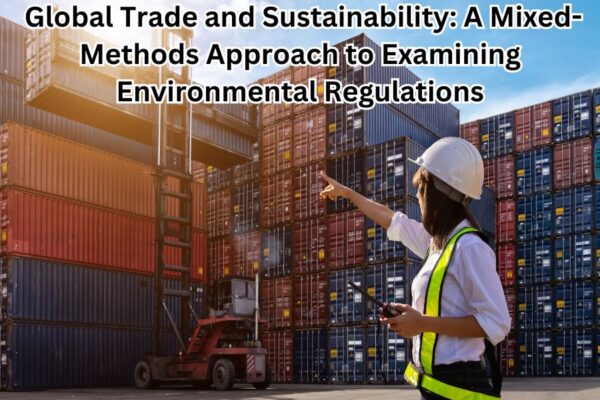Description
Global Trade and Sustainability: A Mixed-Methods Approach to Examining Environmental Regulations
Abstract
Global Trade is important for economic growth, but it increases concerns regarding environmental sustainability. As industries increase to contribute to pollution, climate change, and resource depletion. Environmental regulations play an important role in the trade practices shaping through influencing the transportation systems, supply chain decisions, and production methods. Countries with strict regulations effectively encourage sustainable innovations while those with lenient policies mostly attract industries with footprints of high environment. The study explores the environmental regulations’ impact on global trade and analyzes the way policies shape trade flows as well as economic sustainability. It is properly investigating the stricter regulations that drive shift industries or cleaner production to regions with weaker policies.
The research considers Mixed-Methods approach to assessing the environmental and trade policies relationship. The quantitative phase considers econometric models to properly analyze the trade data, sector-specific environmental footprints, and regulatory strength. It analyzes whether the stringent policies are influencing the production locations, resulting in cleaner technologies or altering the trade balances. Also, the study evaluates the economic trade-offs among international competitiveness and environmental sustainability. The findings provide data-driven insights into the way environmental regulations show the impact on trade patterns over various economies and industries. The phase shares a comprehensive analysis of the economic consequences of the trade policies sustainability driven.
The qualitative phase includes interviews with industry leaders, environmental experts, and policymakers. However the discussions uncover the environmental regulations’ challenges and motivations in the trade context across the globe. Experts share insights into international cooperation, business adaptation, and regulatory compliance with sustainability standards. Through statistical analysis with the expert perspective’s integration, the study provides a well-rounded examination of sustainability and trade. Finally, the findings help policymakers to design effective regulations that properly balance economic growth with environmental responsibility. The research properly contributes to the ongoing discourse regarding sustainable trade policies and makes sure the future where global trade supports both the environmental and economic well-being.
Read more about the topic
Sustainability in Global Trade: Integrating Principles for Inclusive and Resilient Systems
View Other Projects on Global Trade
The Role of Digital Trade Platforms in Expanding Global Trade: A Mixed-Methods Study
The Future of Global Trade in the Context of Digital Transformation: A Mixed-Methods Study








Reviews
There are no reviews yet.